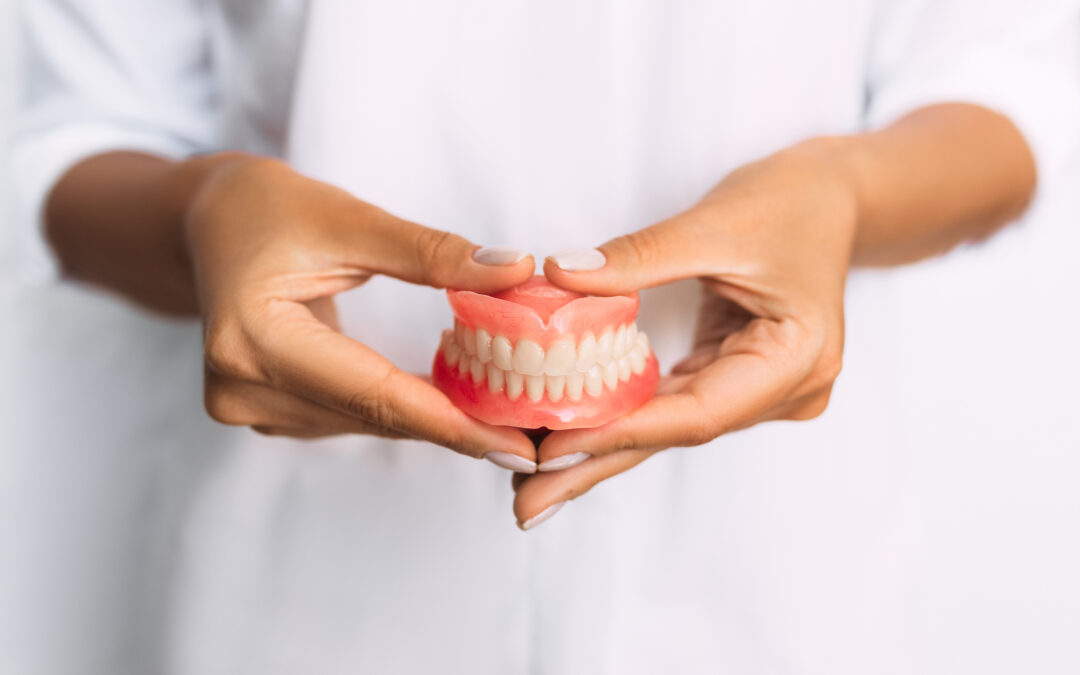If you have lost your teeth due to trauma, disease, or aging, acquiring dentures near you is a great option. They can make a person look better, feel better about themselves, and regain their ability to chew and speak efficiently. However, getting used to dentures can be difficult, particularly for new wearers.
What is involved in a denture evaluation?
When you visit your dentist near you, they will begin by conducting an assessment to determine whether you’re a good candidate for this treatment and if you are, what the best type of dentures are.
Here are some things that may be involved in a denture evaluation:
- Your dentist will seek information about your prior dental and medical experiences, including any medicines you may be taking, allergies, and previous dental procedures.
- Oral health examination.
- Analyzing your bite to ensure that your dentures will fit properly and function well.
- Dental impressions.
- Color and shade selection of your dentures.
- Placement of dentures.
How to make your dentures fit better
Be patient and give yourself time to adjust
Being patient is the most important thing to keep in mind when getting used to dentures. Your mouth needs some time to adapt to the new prosthetic, and everyone’s adjustment time is different. It might take a few days for some individuals, while it might take weeks or even months for others.
You might experience some discomfort, soreness, and irritability during this time frame. Additionally, you might have trouble speaking, eating, or drinking normally. All of these are common adverse effects of getting used to dentures, and they will subside over time.
You can use a denture adhesive to keep the dentures in place or take some over-the-counter pain relievers to make the adjustment time easier to manage. Alternatively, you can begin by eating soft foods and then progressively add harder ones as you become more accustomed to your dentures.
Practice good oral hygiene
Good oral hygiene is essential whether you have dentures or natural teeth. It helps to prevent infection, bad breath and other dental problems. When you have dentures you have to take some extra care to keep them clean and free from bacteria.
A denture brush, mild soap, or denture cleaner should be used to give your teeth a thorough cleaning at least once a day. After a thorough rinse, soak them in a denture cleansing solution overnight.
To get rid of bacteria and debris, be sure to brush your gums, tongue, and the roof of your mouth with a soft-bristled toothbrush. Gum disease may exacerbate wearing dentures, so this will help prevent it.
Seek professional help when needed.
Don’t be afraid to ask for assistance from a professional if you’re having trouble getting used to your dentures. Your dentist can make modifications to your teeth to improve their comfort or suggest alternative therapies to deal with any problems you might be experiencing.
To assist you in enhancing your speaking and pronunciation while wearing dentures, you might also want to think about visiting a speech therapist. This can be particularly useful if you need to retrain your tongue and mouth muscles if you have been missing teeth for a long time.
FAQs
Can I sleep with my dentures on?
No matter the type of dentures you have, sleeping with them is never a good plan and can have a number of negative effects on your health. Make sure to take off your dentures every night before bed to avoid bacterial buildup on your teeth, maintain healthy gums, and maintain the strength and health of your bones.
Can I eat normally with dentures?
You can eat almost anything you want after some weeks of getting used to your dentures as long as your mouth is healthy. There are some foods like popcorn, whole nuts, steak, sweets and chewing gum that can be unfavorable for dentures.
How much pain is involved with getting dentures?
After having new dentures fitted, it’s normal to experience some mild irritability, but this will subside as your mouth adjusts to them. The duration of the pain varies. If you previously wore dentures and are getting new ones, it might take longer.
What should I do if my dentures are loose?
You should contact your dentist to have your dentures fixed if they start to become loose. The dentures can be adjusted by your dentist to fit precisely in your mouth. However, you will need to visit your dentist frequently for adjustments if your bone resorption occurs promptly.
Will my dentures need to be replaced?
Dentures unfortunately don’t last for a lifetime. After 7–10 years, even the highest-quality, most resilient dentures usually need to be changed.
Looking to get dentures in NW Calgary?
Adjusting to dentures can be challenging, but it’s a process that can be made more comfortable with patience, good oral hygiene, and professional help from a dentist in NW Calgary when needed. By following these tips, you can make the transition to dentures as smooth as possible and enjoy the many benefits they offer.
Call us at Dentrix Dental Care today!

